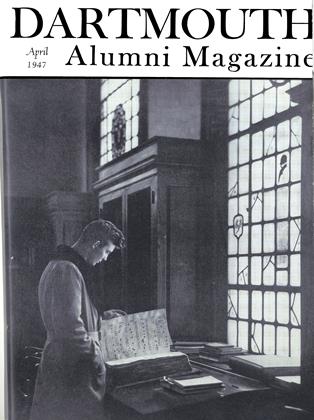by Richmond Lattimore '26. University of Chicago Press, 1947,pp. xii + 170. $2.75.
To translate a single ode of Pindar is no slight undertaking; the translator of the complete corpus deserves a Pindaric ode in his honor. This is especially true in the case of Mr. Lattimore, who has the two requirements for a translator of Pindar, natura and doctrina: the gift of poetic ability and the achievement of sound scholarship. Pindar's rich and pregnant phrases reappear in the imaginative idiom of this modern version. The use of free verse is perhaps the best device for suggesting the infinite variety and suppleness and comp lexity of ancient lyrical forms; and the retention of the antistrophic arrangement is a visual reminder of Pindaric usage.
Hellenists have frequently, been tempted by this most difficult task. In the past fifty-years some half-dozen versions of various parts the Odes have appeared in England, some in prose and some in verse. They can hardly be called adequate. Even the poet Hoelderlin, with his richly imaginative, though tortured, poetic genius, presents but a stilted and ponderous approximation of the original. The truth of the matter is, of course, that great poetry cannot be translated, even by a poet. In the opinion of the present reviewer, however, much of the majesty and glory and beauty of ancient Hellas still glows in this modern version. And that is saying a great deal!
 View Full Issue
View Full Issue
More From This Issue
-
 Article
ArticleFreedom of the Screen
April 1947 By WALTER WANGER '15 -
 Article
ArticleCharles Edward Hovey '52
April 1947 By ALLAN MACDONALD -
 Class Notes
Class Notes1918
April 1947 By ERNEST H. EARLEY, DONALD L. BARR -
 Article
ArticleA Challenge Still Unanswered
April 1947 By BUDD SCHULBERG '36 -
 Article
ArticleThe Undergraduate Chair
April 1947 By Charles Clucas '44 -
 Class Notes
Class Notes1917
April 1947 By MOTT D. BROWN, DONALD BROOKS
Royal Case Nemiah
Books
-
 Books
BooksFaculty Publications
FEBRUARY, 1927 -
 Books
BooksEFFECTIVE USE OF BUSINESS CONSULTANTS.
JANUARY 1964 By ALVAR O. ELBING JR. -
 Books
BooksDON ROBERTO
March 1931 By J. M. Arce -
 Books
BooksEPIGRAMS FROM MARTIAL, A VERSE TRANSLATION.
FEBRUARY 1969 By JOHN BARKER STEARNS '16 -
 Books
BooksTHE EUROPEAN ANCESTRY OF VILLON'S SATIRICAL TESTAMENTS
February 1942 By Leon Verriest -
 Books
BooksTHE HISTORY OF ROME.
JUNE 1959 By NORMAN A. DOENGES




